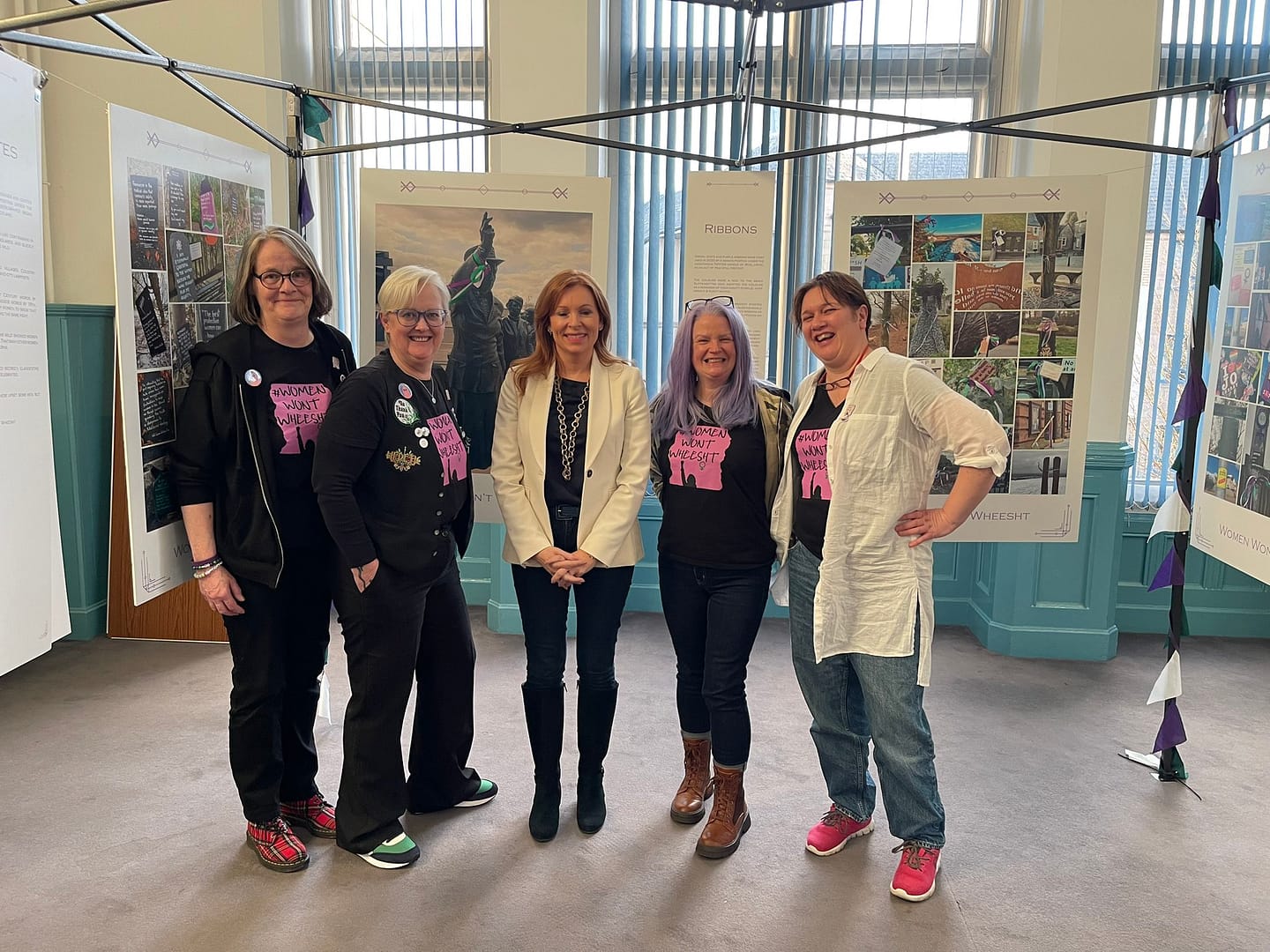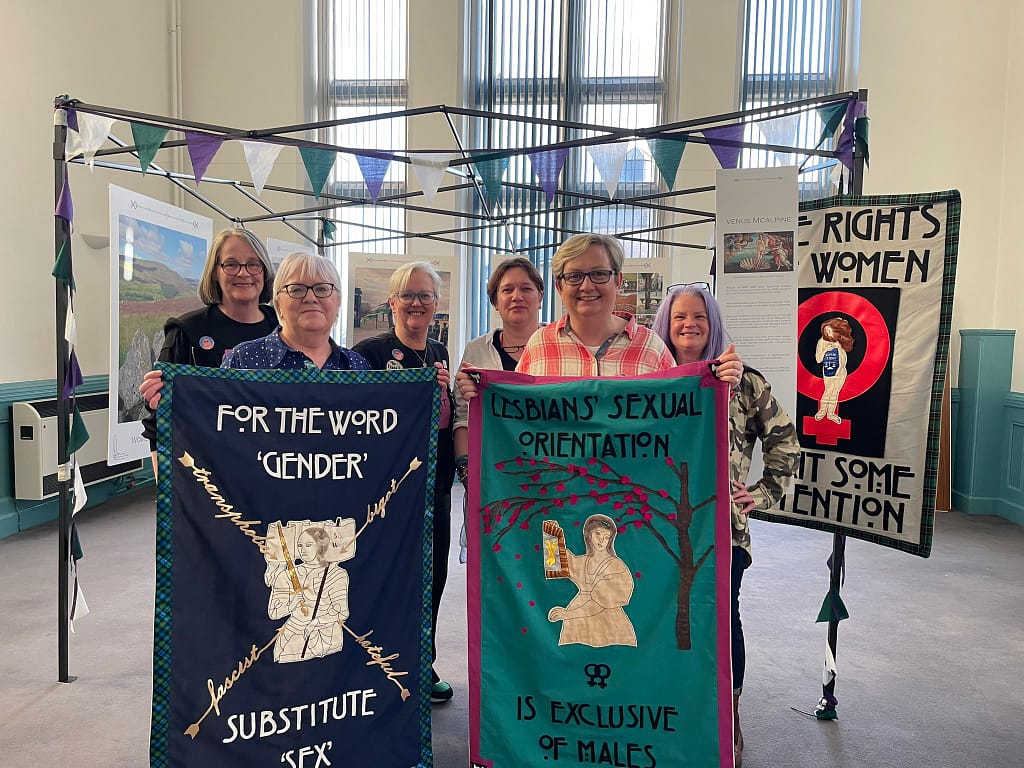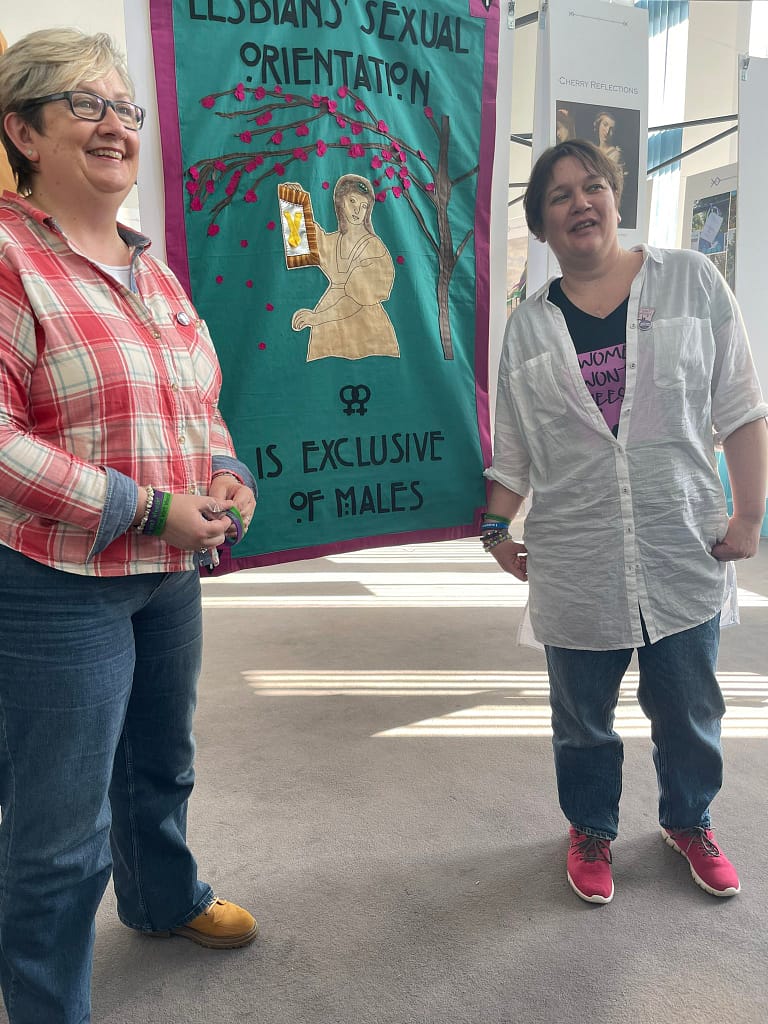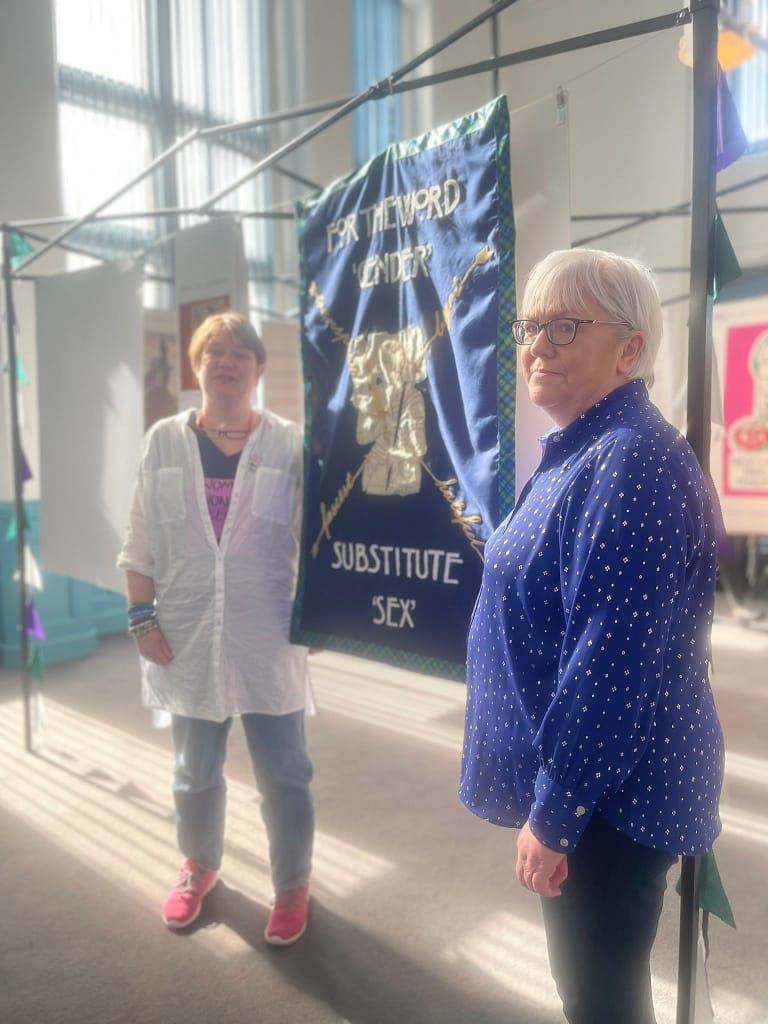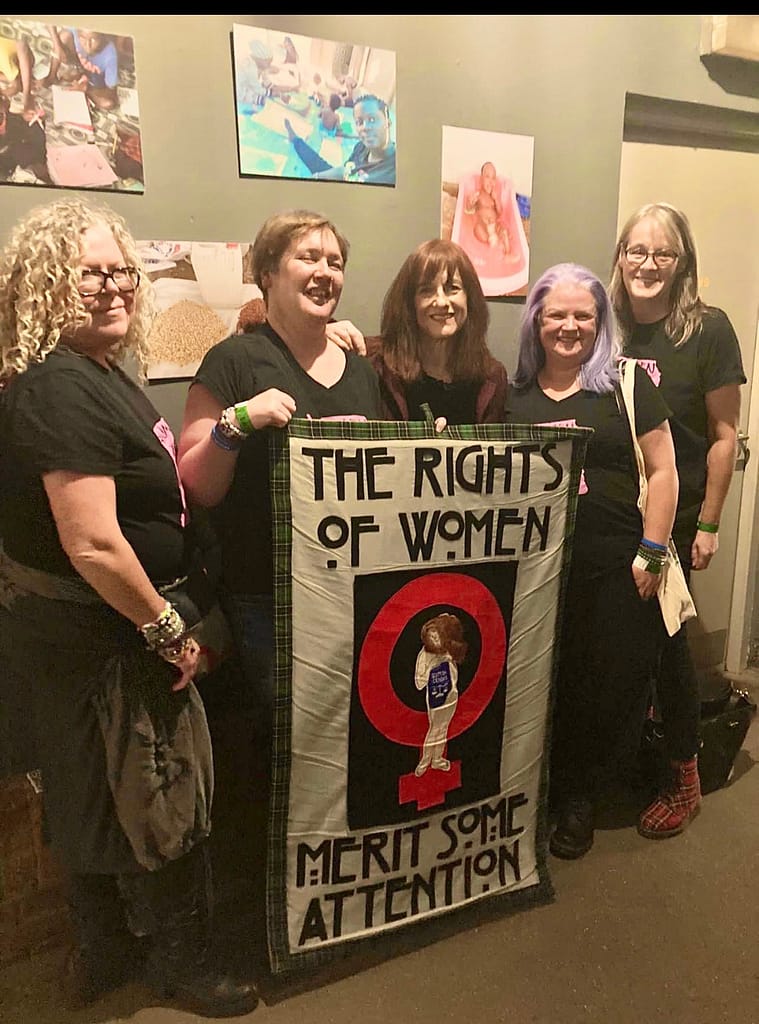On Saturday the 23rd of March Women Won’t Wheesht were proud to present our Creative Accounting exhibition at the Alloa Women’s Festival.
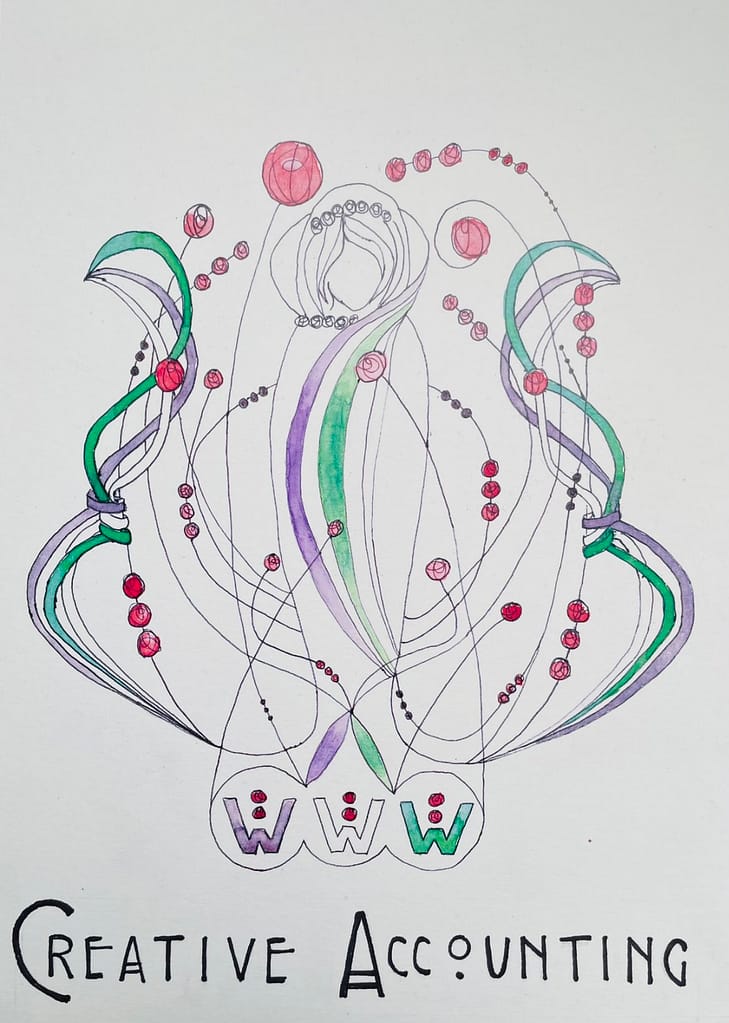
Creative accounting documented the creative methods women in Scotland campaigned for their sex based rights in a difficult and oppressive environment.
Women from across Scotland sent photographs of the stickers, ribbons and slates they placed as acts of resistance against the redefinition of the word woman.
Slates with defiant messages and quotes painted by a woman posting under the handle @MaggieMurphy01 began popping up all over Scotland.
They were distributed like contraband in car parks and town squares, and quickly began appearing in the wild.
In cities, towns and villages, country parks, nature trails and city lampposts. Adorned with 21st century words by defiant women alongside words by 18th, 19th and 20th century women, to show that we were still fighting the same fight.
Finding a slate ‘in the wild’ showed women they weren’t alone. That many other women shared their concerns. In a time of forced secrecy, clandestine slate finds were celebrated.
These upset some men but as it turns out………………..Women Won’t Wheesht.
Green, white and purple ribbons were first used in 2020 by a woman posting under the anonymous twitter handle of @Dis_Critic as an act of peaceful protest. The colours were a nod to the brave Suffragettes who adopted the colours as a reminder of their Dignity (purple), Hope (green) and Purity (white).
Although this form of protest started here in Scotland women all over the world adopted Suffragette coloured ribbons as a symbol of their resistance to attacks on their rights.
The purple, white and green were used as a way to signify opposition to gender ideology in a climate where any dissent was punished. In a climate where women couldn’t meet freely, or voice their fears.
Although this is slowly changing, these colours are still universally recognised as a defiant gesture of solidarity, and women now proudly and seditiously wear their purple, green and white t-shirts, bags , lanyards and jewellery.
Women started using stickers to demonstrate their dissent to gender ideology around 2018. In a situation where they were unsure whether they would be charged with a hate crime, where they had seen being threatened and punched for voicing their concerns or losing their jobs, stickers were a less risky way to communicate with the public.
Such was the febrile atmosphere during this time, politicians claimed their offices had been ‘vandalised’ and their staff were under threat by the placing of a couple of stickers with dissenting opinions.
The stickers themselves were colourful, creative, informative and often incredibly amusing.
Banners
We also showcased three banners created by Jenny Reilly detailing the contribution of prominent women in the fight for sex based rights. These banners reflected the banners created by Suffragettes with both modern and traditional techniques and materials.
The Birth of Venus – Sandro Botticelli
Whilst an SNP MSP, Joan McAlpine queried Scottish Census guidance that allowed males to be counted as females in Census returns.
Her queries resulted in her being labelled TERF, transphobe, wanker of the week, trash, and worse.
When she attended a founding meeting of the LGB Alliance, an organisation set up to promote the rights of lesbians, bisexuals and gay men, a photo from the event was circulated amongst many in her party with her image circled in red.
This led to further bullying with many young misogynistic members of the SNP putting the red circle in their twitter names and threatening violence towards her. After the SNP introduced a discriminatory equality mechanism Joan lost her MSP seat.
Joan now works as a journalist and is a project director of the Robert Burns Ellisland Farm and museum.
Jeanne d’Arc – unknown
In 2020 the Forensic Medical Services (Victims of Sexual Offences) (Scotland) bill reached the Scottish Parliament. The purpose of the bill was to improve access to healthcare services for victims of rape and sexual assault.
Despite victims recommending that the word gender was changed to sex in relation to medical examiners, so that victims could be confident they’d receive a same sex examiner if requested, the Scottish Government ignored this and Rape Crisis Scotland backed the Government.
During this period, many women were being vilified for the belief that sex mattered, was important and immutable.
Johann Lamont, Labour MSP, proposed an amendment to the bill – For word ‘gender’ substitute ‘sex’.
Despite facing a backlash from those within the Parliament and outwith, and with the backing of a social media and letter writing campaign by Scottish Women, the amendment passed and the Forensic Medical Service Act became law.
Truth Revealing the Artifice of Painting – Ginevra Cantofoli
In April 2019 Joanna Cherry MP signed a letter along with 14 other senior SNP politicians calling for the Scottish Government not to rush into legislating on gender reform warning that it could change the definition of what it means to be male and female.
In the same month, as a member of the Joint Committee on Human Rights, she raised the issue of online abuse and silencing of gender critical women on Twitter/X.
Since speaking up for sex based rights, particularly the rights of Lesbians, Joanna has faced continued abuse, threats of rape and violence and has had to employ additional security measures. She has received very little support from members within her Party and in February 2021 she was sacked from the SNP front bench and wrongly branded transphobic for criticising the Hate Crime legislation going through the Scottish Parliament.
Many of the Scottish public were fearful the hate crime bill would inhibit free speech and inhibit debate, particularly around the subject of Sex and Gender.
Despite punishment, unfair treatment and threats, Joanna has continued to stand up for women in Parliament.
We were delighted so many women came to visit our exhibition at Alloa, especially the women who contributed photographs.

